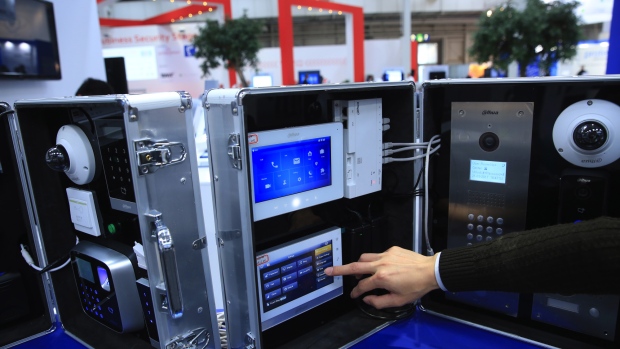May 21, 2019
Trump Weighs Blacklisting Two Chinese Surveillance Companies
, Bloomberg News

(Bloomberg) -- President Donald Trump is considering blacklisting two Chinese surveillance giants, Hangzhou Hikvision Digital Technology Co. and Zheijiang Dahua Technology Co., over accusations of human rights violations, according to people familiar with the matter.
The restrictions would be similar to those imposed last week on Huawei Technologies Co., and would sharply curtail the companies’ access to the U.S. market and American suppliers.
Both companies have been accused by human rights groups of being part of the Chinese government’s persecution of the Uighurs, a Muslim ethnic group, in the western region of Xinjiang.
The Trump administration had weighed taking action against Dahua and Hikvision as well as a top official in Xinjiang earlier this year but held off because of the trade talks with China, the people said late Tuesday.
Other people with knowledge of the deliberations said the U.S. would be targeting companies involved in biometrics linked to the surveillance of the Uighurs. Some of that technology relies on American-made components.
It was not clear how soon the administration might act or whether a decision has been made. The White House and the Commerce Department did not respond to requests for comment late Tuesday night. The possible blacklisting was first reported by the New York Times.
Senator Marco Rubio of Florida and other lawmakers sent a letter in April to Secretary of State Michael Pompeo, Commerce Secretary Wilbur Ross and Treasury Secretary Steven Mnuchin urging them to impose sanctions against officials and companies “complicit in gross violations of human rights” in Xinjiang.
A United Nations assessment said tens of thousands to “upwards of 1 million” Uighurs have been detained.
The companies manufacture video surveillance systems, and along with other firms in the same business, have benefited handsomely from Chinese President Xi Jinping’s unprecedented push to keep tabs on the country’s 1.4 billion people. About 176 million video surveillance cameras monitored China’s streets, buildings and public spaces in 2016, versus 50 million in America, according to IHS Markit.
Hikvision’s stock fell as much 10% before recovering to be 4.5% lower as of 11:01 a.m. in Shenzhen.
The Commerce Department put Huawei on an “Entity List” -- meaning any American company would need a special license to sell products to Huawei, the world’s largest networking gear maker and second-largest smartphone brand.
Human rights advocates and others fear that China’s surveillance industry might help foreign governments suppress civil liberties. Another fear, highlighted by U.S. scrutiny of Huawei, is that exported Chinese surveillance equipment could be used by Beijing for spying.
The Huawei decision touched off a massive disruption in technology supply chains, hitting some of the biggest component-makers as Intel Corp., Qualcomm Inc. and Broadcom Inc. told their employees they won’t provide products to Huawei until further notice.
Timing of the U.S. action raised questions about whether Trump was punishing the company in part to gain a negotiating edge with Beijing in a deepening clash over trade. Talks between Beijing and Washington deadlocked this month as Trump accused China of backing out of a deal that was taking shape with U.S. officials, saying China reneged on an agreement to enshrine a wide range of reforms in law.
On Monday, the Commerce Department granted 90 days of relief for certain U.S. broadband companies using Huawei equipment. Small phone carriers, the main U.S. customers for Huawei, had worried the ban could keep them from performing even routine activities like ordering replacement parts or patching software.
--With assistance from Steven T. Dennis, Shawn Donnan, Alyza Sebenius and Robert Fenner.
To contact the reporters on this story: Jenny Leonard in Washington at jleonard67@bloomberg.net;Nick Wadhams in Washington at nwadhams@bloomberg.net
To contact the editors responsible for this story: Michael Shepard at mshepard7@bloomberg.net, John Harney
©2019 Bloomberg L.P.





